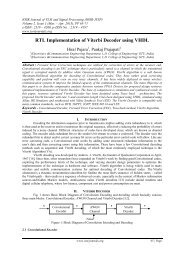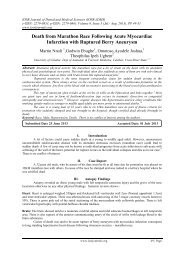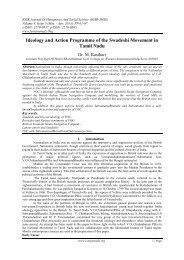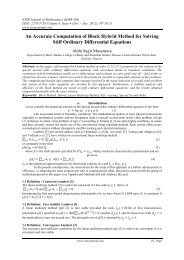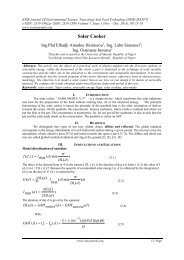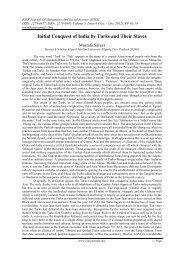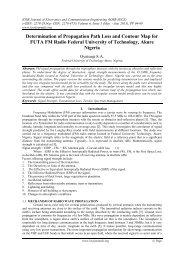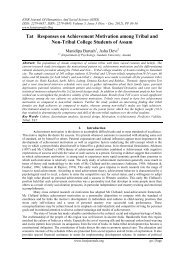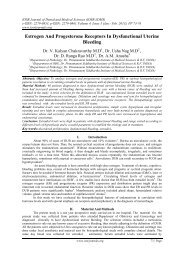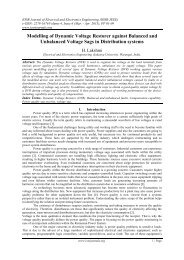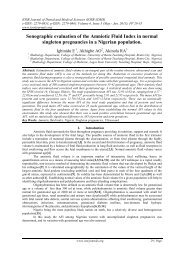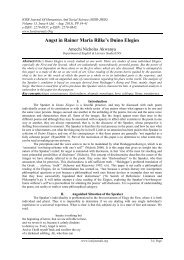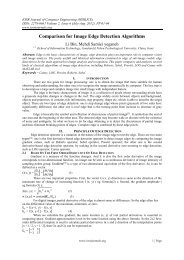Design Compatibility of Classroom Furniture in Urban and ... - IOSR
Design Compatibility of Classroom Furniture in Urban and ... - IOSR
Design Compatibility of Classroom Furniture in Urban and ... - IOSR
Create successful ePaper yourself
Turn your PDF publications into a flip-book with our unique Google optimized e-Paper software.
<strong>IOSR</strong> Journal Of Humanities And Social Science (JHSS)<br />
ISSN: 2279-0837, ISBN: 2279-0845. Volume 6, Issue 2 (Nov. - Dec. 2012), PP 06-16<br />
Www.Iosrjournals.Org<br />
Fuel Subsidy Removal <strong>and</strong> M<strong>in</strong>d Control Game In Nigeria: A<br />
Critical Discourse Analysis Perspective<br />
Chris Uchenna Agbedo 1 , Samuel S. Akaan 2<br />
1 Department <strong>of</strong> L<strong>in</strong>guistics, Igbo & Nigerian Languages, University <strong>of</strong> Nigeria Nsukka- Nigeria<br />
2 Department <strong>of</strong> English, College <strong>of</strong> Education, Oju Benue State, Nigeria<br />
Abstract: This paper addresses the arguments for <strong>and</strong> aga<strong>in</strong>st fuel subsidy removal <strong>in</strong> Nigeria as a political<br />
discourse <strong>in</strong> the Nigerian media. We exam<strong>in</strong>e the political discourse from the theoretical <strong>and</strong> methodological<br />
perspectives <strong>of</strong> discourse structure, l<strong>in</strong>guistic function, <strong>and</strong> ideological bear<strong>in</strong>g to determ<strong>in</strong>e how the groups on<br />
both sides <strong>of</strong> the divide exploit their social power to control the public discourse <strong>and</strong> by extension control the<br />
m<strong>in</strong>d <strong>and</strong> actions <strong>of</strong> one another. The results <strong>of</strong> the analysis tend to show that the more powerful group<br />
represented by the Federal Government struggles to redef<strong>in</strong>e the discursive structure <strong>of</strong> those properties <strong>of</strong> the<br />
social situation that are relevant for the production <strong>and</strong> comprehension <strong>of</strong> the fuel subsidy discourse to change<br />
the personal/social cognition <strong>and</strong> mental representations <strong>of</strong> fuel subsidy by Nigerians as one sure way <strong>of</strong><br />
achiev<strong>in</strong>g the ultimate aim <strong>of</strong> reproduc<strong>in</strong>g dom<strong>in</strong>ance (power abuse) <strong>and</strong> hegemony. The less powerful group<br />
led by the organized labour combats this m<strong>in</strong>d control onslaught by enlist<strong>in</strong>g discursive strategies that provide<br />
<strong>in</strong>formation from which derive alternative knowledge <strong>and</strong> beliefs needed by the Nigerian masses to challenge<br />
the discourses <strong>and</strong> <strong>in</strong>formation about fuel subsidy, which they are exposed to by the Federal Government.<br />
Keywords: CDA, fuel subsidy, m<strong>in</strong>d control, Nigeria, power.<br />
I. Introduction<br />
On 4 October, 2011, President Goodluck Jonathan <strong>in</strong>formed the National Assembly about his<br />
government‘s plan to beg<strong>in</strong> the removal <strong>of</strong> fuel subsidy <strong>in</strong> 2012. Accord<strong>in</strong>g to the 2012-2015 Medium Term<br />
Fiscal Framework (MTFF) <strong>and</strong> the Fiscal Strategy Paper (FSP) which the President sent to the National<br />
Assembly, ―A major component <strong>of</strong> the policy fiscal consolidation is government‘s <strong>in</strong>tent to phase out fuel<br />
subsidy, beg<strong>in</strong>n<strong>in</strong>g from the 2012 fiscal year. That, the President noted, ―will free up to about N1.2 trillion <strong>in</strong><br />
sav<strong>in</strong>gs, part <strong>of</strong> which can be deployed <strong>in</strong>to provid<strong>in</strong>g safety nets for poor segment <strong>of</strong> the society to ameliorate<br />
the effects <strong>of</strong> subsidy removal.‖ In throw<strong>in</strong>g her weight beh<strong>in</strong>d the fiscal policy, the M<strong>in</strong>ister <strong>of</strong> F<strong>in</strong>ance <strong>and</strong> the<br />
Coord<strong>in</strong>at<strong>in</strong>g M<strong>in</strong>ister <strong>of</strong> the Economy, Dr (Mrs.) Ngozi Okonjo-Iweala, averred that it was only the removal <strong>of</strong><br />
fuel subsidy that would guarantee the success <strong>of</strong> the Medium Term Fiscal Framework (MTFF). With the claim<br />
that the subsidy would have risen to N1.2trillion by the end <strong>of</strong> 2011, the federal government <strong>in</strong>sisted that there<br />
was no go<strong>in</strong>g back on the removal.<br />
This proposed fiscal policy met with stiff opposition from a wide segment <strong>of</strong> the Nigerian society.<br />
Apart from the organised labour that vowed to shut down the country should the government go ahead to<br />
implement the policy, a good number <strong>of</strong> discern<strong>in</strong>g Nigerians saw the removal <strong>of</strong> fuel subsidy as the bra<strong>in</strong>child<br />
<strong>of</strong> the Bretton Woods Institutions <strong>in</strong>tended as a neocolonial stratagem to teeter the Nigerian economy<br />
irredeemably to the enslav<strong>in</strong>g apron-str<strong>in</strong>gs <strong>of</strong> the Euroamerican imperialism. The Bretton Woods Institutions<br />
are the World Bank, <strong>and</strong> the International Monetary Fund (IMF) set up at a meet<strong>in</strong>g <strong>of</strong> 43 countries <strong>in</strong> Bretton<br />
Woods, New Hampshire, USA <strong>in</strong> July 1944 to help rebuild the shattered postwar economy <strong>and</strong> promote<br />
<strong>in</strong>ternational economic cooperation. But critics claim the Institutions were go<strong>in</strong>g beyond their orig<strong>in</strong>al m<strong>and</strong>ate<br />
especially <strong>in</strong> the Third World countries such as Nigeria, where members <strong>of</strong> President Jonathan‘s economic<br />
management team were f<strong>in</strong>gered as arrowheads <strong>of</strong> this economic re-colonization by the western powers. This<br />
provided the basis <strong>of</strong> the ideological divide on the contentious issue <strong>of</strong> fuel subsidy between President<br />
Jonathan‘s government <strong>and</strong> the opposition.<br />
This ideological difference predisposed both parties to take refuge <strong>in</strong> the manipulative use <strong>of</strong> language,<br />
which provided the enablement to control the other party aga<strong>in</strong>st its best <strong>in</strong>terests, the control be<strong>in</strong>g aimed at the<br />
recipients‘ verbal contribution to the <strong>in</strong>teraction <strong>and</strong> cognitive processes <strong>of</strong> comprehension <strong>and</strong> <strong>in</strong>terpretation <strong>of</strong><br />
fuel subsidy removal. The forego<strong>in</strong>g harks back to an abuse <strong>of</strong> ideological power, as outl<strong>in</strong>ed <strong>in</strong> Fairclough‘s<br />
classification differentiat<strong>in</strong>g between economic, state <strong>and</strong> ideological power, (Fairclough 1991; 1992; 1995a).<br />
While economic power deals with the relationship between social classes <strong>in</strong> the process <strong>of</strong> economic production,<br />
state power is exercised by the government, army, police <strong>and</strong> various social <strong>in</strong>stitutions, ideological power<br />
considerably complements the first two, be<strong>in</strong>g exercised <strong>in</strong> discourse <strong>and</strong> def<strong>in</strong>ed as the power to project one‘s<br />
practices as universal <strong>and</strong> ‗common sense‘.<br />
www.iosrjournals.org<br />
6 | Page



